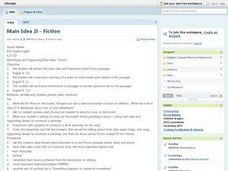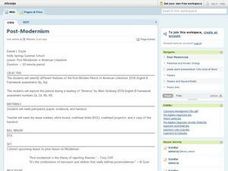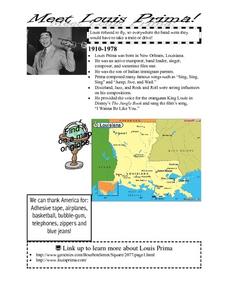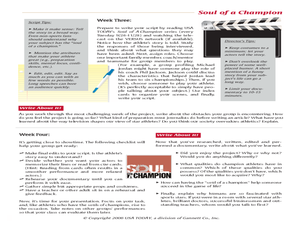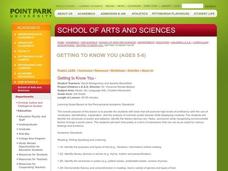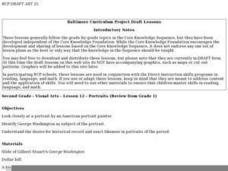Curated OER
Getting Down and Dirty: An Exploration of the 1930's
Pupils complete an exploration of the 1930s. Using artwork and primary source documents, they compare, contrast and identify cause and effect relationships in the events of the decade. They discover how the events then affect people...
Curated OER
Main Idea- Fiction
Eighth graders investigate the concept of main idea and supporting details, and how they are used in the genre of fiction. In this literacy lesson, 8th graders listen to a fictional passage and take notes on the characters, setting,...
Curated OER
Post- Modernism
Students participate in a lesson that investigates post-modernism in American literature. They conduct the lesson with the help of reading "America" by Ginsberg to create context. Then students define the genre and the culture that has...
Curated OER
Meet Louis Prima!
Students discover the difference in major and minor tonality after a brief introduction to Louis Prima. They discuss swing dancing and Louis Prima's role in the "Jungle Book" as the character King Louis. Students listen to the song...
Curated OER
Egg-ceptional Poetry Writing
Students recognize that eggs have nutritional value. In this eggs lesson plan, students create poetry for a shape book on eggs. Students participate in additional games and activities about the egg.
Curated OER
The Ultimate Athletic Background
Eighth graders analyze the criteria used to identify "Soul of a Champion" athletes. In this Current Events lesson, 8th graders write, edit and organize a script for a “live” documentary on the athlete. Students rehearse and perform...
Curated OER
Getting to Know You
Students explore the concept of communication. In this communication lesson, students create collages featuring their likes and dislikes. Students present the collages to their classmates.
Curated OER
Fables and Trickster Tales Around the World
Students analyze fables and trickster tales from various cultural traditions. In this fable analysis lesson, students identify the elements of fables and trickster stories. Students read Aesop's fables and Ananse spider stories. Students...
Curated OER
Lesson Plans for History: The Annunciation
Students analyze The Annunciation and complete related art activities. In this art analysis lesson plan, students analyze the art piece The Annunciation and create an altar piece. Students discuss the importance of a label and write one...
Curated OER
It's Your Birthday! Expository Writing Unit 2
Students create an expository essay. For this writing lesson Students are assigned a country and must conduct research surrounding a historic event that occurred in that country at the time of their birth.
Curated OER
Researching Using Books
Young scholars investigate researching techniques by exploring their library. In this literature references lesson, students identify the different types and genres of books that are readily available at their local library as well as...
Curated OER
Step-by-Step to the Final Destination
Students write their own radio plays. For this writing process lesson, students script their own scary radio plays based on the radio plays they read in class in previous lessons. Students also perform the plays for their classmates.
Curated OER
Conversation Lesson – Music
Students discuss the type of music they listen to and discuss a set of music related words put on the board by the teacher. In this music lesson, students work in pairs to discuss words and complete an activity asking questions of...
Curated OER
"What is an American?"
Eleventh graders ponder about what it means to be an "American." They discuss the impact of an author's word choice and sentence structure on text. They identify some major themes and development of the Letters... Compose paragraphs and...
Curated OER
Blending Fiction and Nonfiction to Improve Comprehension and Writing Skills
Students explore a content area by reading both fiction and nonfiction texts on the topic. They do more research online about the topic. After comparing the texts, they create their own written original work, using both narrative and...
Curated OER
Growing Seeds
In this science worksheet, students read 5 different scenarios with varied growing conditions for plants. Students make a prediction for each: Will it grow a little, grow a lot, or not grow at all?
Curated OER
Rehearsal and Sightreading Techniques
Eighth graders prepare the two pieces "American Celebration" and "Patriotic Bits and Pieces" for an upcoming performance. This lesson is a forty-five minute lesson geared towards a middle school advanced band (8th Grade). National and...
Curated OER
Edgar Allan Poe and Anna Katherine Green
Students analyze the genre of detective fiction through stories by Edgar Allan Poe and Anna Katherine Green. In this detective fiction lesson, students read "The Tell-Tale Heart" and "The Second Bullet." Students read the summaries and...
Curated OER
Predicting a Mystery's Solution
Sixth graders explore the genre of mystery. In this language arts lesson, 6th graders predict the solution to a mystery based on the text. Students read a text and predict the solution.
Curated OER
Character's Motive
Why do people commit crimes? Middle schoolers investigate characters' motives for committing a crime in a character analysis lesson. First, they read the book Chasing Vermeer and identify the suspects. They then record the details about...
Curated OER
Creating Found Poetry From Picture Books
Students use picture books to identify poetic elements and word choice. They create a "found poem".
Curated OER
Getting to Know You
Third graders explore different types of poetry and illustrate their own experiences through creating their own poem. In this getting to know you lesson plan, 3rd graders create and recite their poems with a self-portrait.
Curated OER
Visual Arts: Portraits
Second graders examine a portrait of George Washington, and analyze the historical record and likeness in portraits of the period. They create their own portraits from snapshots brought to school.
Curated OER
Lamarck Is Dead!
Students read Lamarck's obituary and respond to questions. They discuss the four laws from Lamarack's studies. Students apply this information to scientific theories in general.



